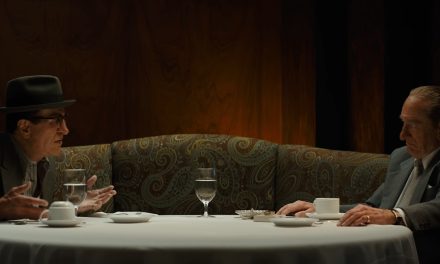Tessa Thompson (Creed III) delivers a reserved and subdued one-woman performance as Beth, a solitary helpline volunteer. Over the 90-minute movie, Thompson is the only woman on screen, fielding nighttime calls from the lonely and the depressed with an unnatural empathy.
The Listener shares its DNA with other phone-based dramas, including Gustav Moller’s police dispatch thriller The Guilty and Steven Knight’s Tom Hardy-fronted Locke. The Listener is carried by a single on-screen performance, interacting with other characters who solely appear as voices. It is a gentle addition to the genre, less thriller and more a contemplative musing on those struggling in the shadows.
Written by Italian producer turned screenwriter Alessandro Camon, who co-scripted Oren Moverman’s The Messenger, with Steve Buscemi directing, The Listener feels more like a stage play than a full-length movie. His first directorial feature since 2007’s Interview, his lensing creates a specific atmosphere. This film, even with the same script, would not have had the same effect if it had been set in a busy call center.

The film is visually very subdued, with Beth walking through her home and turning on table lamps to add different types of dim lighting to the proceedings. Beth is a hard character to connect with; her unwavering empathy almost makes her cold. In the space between calls, she does mundane tasks within her home, but it’s never enough to get a grip on her true personality.
Taking over the witching hour slot, a calm Beth puts on an earpiece and gets to helping people with their issues. On her very first call, we learn that Beth (not her real name) is her final month with the line, and the following 90 minutes indicate why this type of work can be emotionally draining.
In just a few hours, Beth deals with upsetting calls from those marginalized from society and on the edge, dealing with every issue with a calmness. There’s a desperate ex-con (Prometheus actor Logan Marshall-Green) still finding his feet in a post-pandemic world, triggered by the isolation of Covid-19 and the masks worn in public. There is also a bipolar woman (Search Party’s Alia Shawkat) who is struggling to contain her thoughts without her medication, a teenager whose hatred of women almost forces Beth to break character (King of Staten Island star Ricky Velez), and a veteran with PTSD who recounts the war stories which led him to drink.
Corinne’s story (Margaret Cho) is one of the more heartbreaking as a desperate woman trying to care for her special needs daughter, whilst Jinx’s (Star Trek: Discovery’s Blue Del Barrio), a teenage runaway pressured into prostitution by her drug-addicted boyfriend, is slightly less nuanced.
These calls deliver different layers of effectiveness. Because you can’t see their facial expressions, their dialogue has to be heavy-handed to get the point across. At times, these callers feel like stereotypes of different parts of society. The stories drift into parody, ticking the boxes for the different types of tragedy available in society.
Not to say that none of the phone calls are effective. Alia Shawkat’s Sharon delivers a moving speech about the perils of modern life as an overthinker. Logan Marshall Green’s description of life after incarceration and the lingering resentment toward the way ex-cons are treated also provide something for audiences to ponder.

Things take a slightly more compelling turn in the last 30 minutes when a woman (voiced by Rebecca Hall) declares she is going to end her life and combatively dares Beth to change her mind. The woman makes a compelling case for why humanity is already dying and how it’s actually admirable to take back control by ending it before political unrest and global warming do it for you. Hall’s cutting tone adds imaginary flesh to the disembodied voice as the two women take philosophy, ethics, and religion.
This last caller forces Beth to drop her defenses and disclose her own vulnerabilities. It’s the most authentic portion of the movie, but it’s perhaps too late for audiences to connect with the protagonist. Much like the callers, audiences will be left wondering what type of person Beth is and why anyone would volunteer for such work.
It’s a remarkable performance from Thompson, whose facial expressions will make or break a movie like this. With a flick of an eye or a fiddle with a pencil, her body language indicates Beth is a woman making quick mental mathematics on how to best deal with each caller. Sometimes, her face will hint at her true reaction to the call, even when her voice and words stay calm and collected.
The theatrical nature of the writing and performances takes the realism out of the movie. The callers articulate their problems and emotions in a way that never rings true. Unlike Thompson’s more grounded performance, the dialogue often feels artificial and rehearsed. There is always a sense that these calls are rehearsed and written dialogue, performed like monologues rather than real calls made by real people.
The Listener will be released on March 29, 2024!
For more Reviews, make sure to check back to That Hashtag Show.

![The Listener: Tessa Thompson Shines In Subdued Drama About A Helpline Volunteer [Review]](https://www.thathashtagshow.com/wp-content/uploads/2024/03/431354651_381940748131451_5045340617395555828_n-1280x640.jpg)



